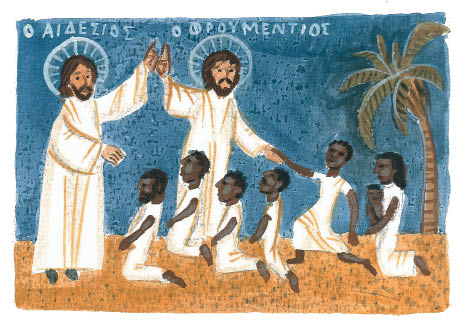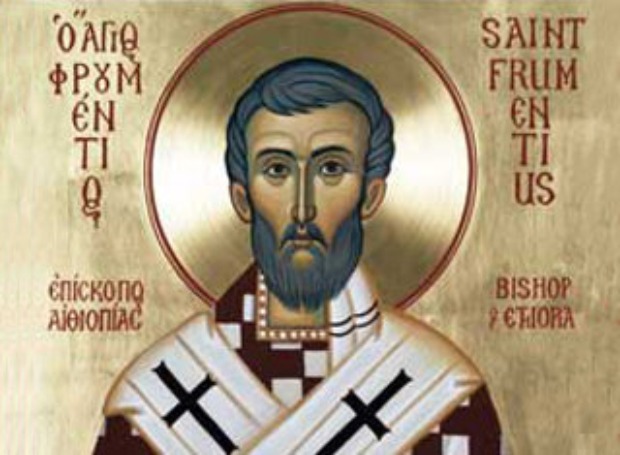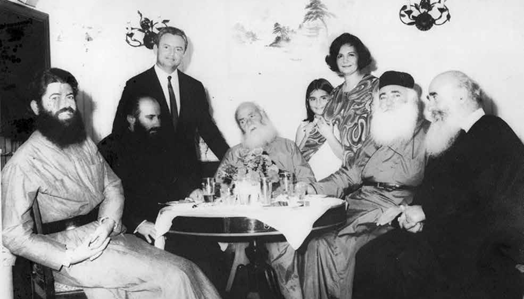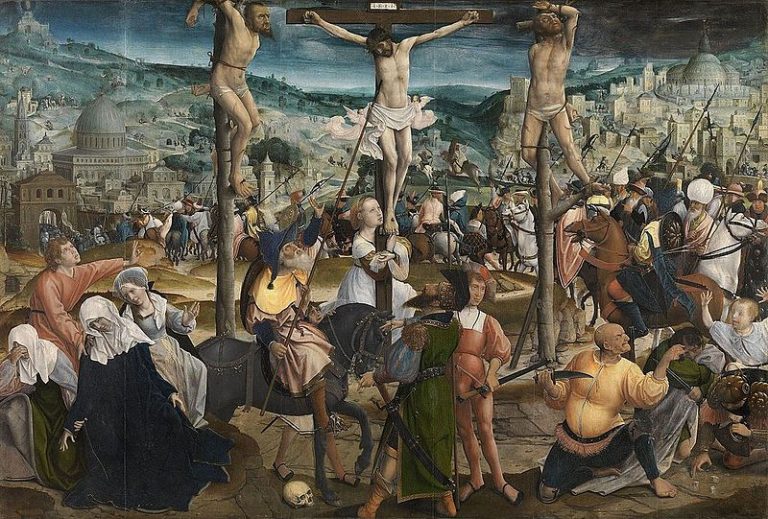Saint Frumentios, the missionary of Ethiopia
Saint Frumentios lived when Constantine the Great was emperor (330 AD). According to the synaxarist of St. Nicodemus and the ecclesiastical historian Sozomenos, Frumentius and his brother Aidesio accompanied a philosopher named Meropius, a Tyrian by birth, who was on his way to Ethiopia to study its history. But they fell into the hands of ruthless bandits. All the passengers on the ship on which they were travelling were killed in various ways – including the philosopher – except the two brothers, who were spared because of their young age. They were imprisoned and offered to the king of Ethiopia as slaves. The king quickly saw the abilities of the two brothers and appointed them in charge and stewards of the royal court. Shortly before he died, he rewarded them by granting them freedom. The queen, however, begged them to stay a little longer until her son grew up and was able to rule the kingdom on his own. So, without seeking it, God’s grace of servants made them governors of the kingdom of Ethiopia. During the time that Fromentius ruled the kingdom, he had gathered the Christians of the region – mostly merchants – and catechized them. They all prayed and worshipped together – after they had built temples – and he urged them to be missionaries. When the time came and the heir to the throne became a teenager, they asked for permission to return home. Thus, Aideios returned to Tyre, met his family and stayed with them, after being ordained a priest, and Frumentius chose missionary activity. He longed to return to Ethiopia, this time not as a servant of the earthly king but of the heavenly one, not as a slave but as a free man in Christ Jesus. He shared this desire with the Archbishop of Alexandria, Archbishop Athanasius the Great, pointing out to him that there was an urgent and irreversible need for direct missionary ministry in Ethiopia. Athanasius replied. A question – an exhortation which was followed by the consecration of Frumentius as bishop by the Patriarch of Alexandria and his return to enlighten the Ethiopians with the light of Christ. Frumentius exercised his pastoral duties with great diligence and devotion, to the point that the entire Ethiopian people were baptized. Finally, after the Lord had first given him the gift of miraculous miracles, He called him to Himself in a peaceful manner.

Saint Frumentius, the desire for mission and the missionary initiative
A beautiful saying states: “If you want something badly, the whole universe conspires to make it happen.”
The love of Saint Frumentios for Christ and for his fellow man, having as a basis the words of the God-Man “the things that are impossible with men are possible with God” (Lk 18,27), became a missionary desire and this desire, accompanying the divine plan, created his missionary initiatives. But let us take the facts from the beginning. It is possible, based of course on what followed in the life of the saint, that Froumentius accompanied the philosopher Meropius not only to learn about the history, customs and traditions of the Ethiopians but also out of missionary interest. This trip was scheduled to be a round trip. After studying the life of the Ethiopians they would draw their conclusions and return home. Unless…
- They were spared by the ruthless bandits who killed all the crew and the ship’s passengers and gave them to the king…
- The king, instead of underestimating them and not caring about them – since as slaves they were of no particular value – noticed them, understood their abilities, treated them as if they were the only servants he had and appointed them as his stewards…
- The king died and the queen felt that the two brothers would be the best suited to raise the young king and thus have enormous power in the administration of the kingdom…

God’s plan for the salvation of the people of Ethiopia is clearly revealed. From here on, the missionary initiatives of St. Fromentius begin. He gathers the few Christians in the country and creates the first Church. He cultivates them with his word, with common prayers and church services, but above all he becomes a shining example for all. And all this, as a layman. He is offered the opportunity to return to his homeland and his parents. He, instead, visits the Patriarch of Alexandria to inform him of the newly founded Church of Ethiopia and to beg him, not to elect him, but to send a bishop to shepherd his faithful disciples. He leaves Alexandria, now a bishop, and heads for his flock… In his ears echoes the words of St Athanasius, addressed to every believer, to every soul inflamed with love and possessed by a desire for mission: ‘ And who, my dear, is better and more able than you…’ to minister, by the grace of God, the work of Orthodox witness to the nations?




